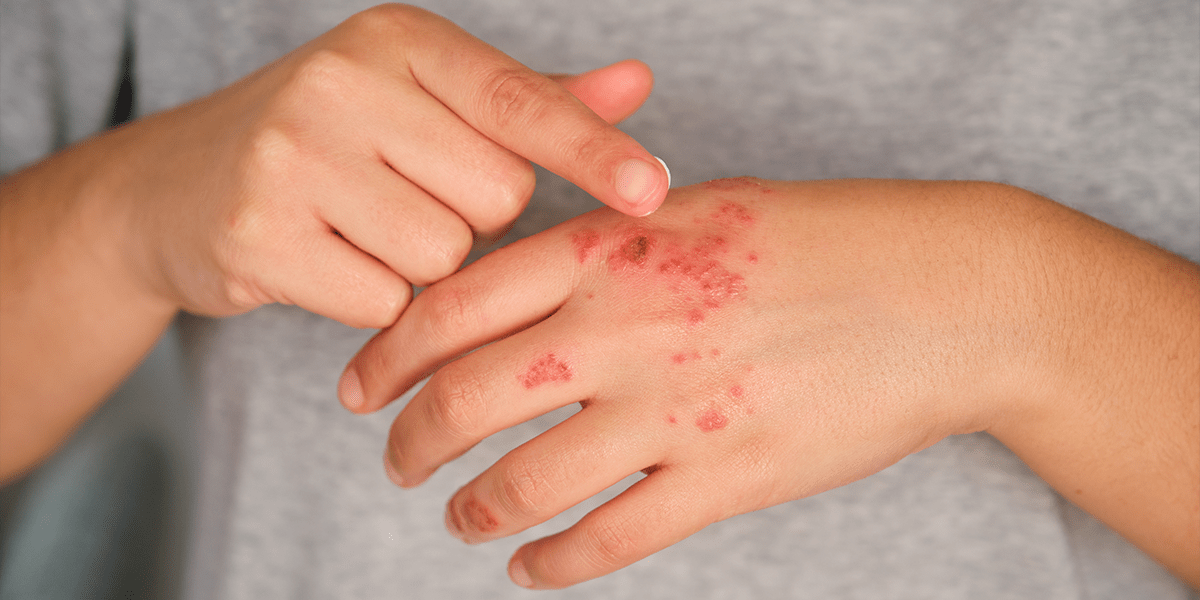Eczema
- Dr Maryum Sohail
- February 14, 2024
- 11:48 pm

Seeing a red, dry, layered rash on your kid’s body could have concerned you that it could spread or taint others. Eczema affects many people globally, but children are more likely to get it. Children between 5 and 6 will most likely be involved in the first year of life. Eczema usually improves with age but may remain into adolescence or adulthood. Your child cannot spread Eczema because it is not contagious.
How can I tell if this is Eczema?
Dermatitis can fluctuate in seriousness and show among kids. Based on their age group, Eczema can manifest in different locations of the body.
In infants, Eczema may present as:
- Red, itchy, and swollen patches of the skin that look like rashes
- Affected area may feel rough, scaly, and dry to touch
- Frequently seen on cheeks, chins, forehead, scalp, or in skin folds such as elbows, knees, behind the ears
In older children and teenagers, Eczema may exhibit the signs of chronic skin illness:
- Intense itching that can be distressing
- Rash appearing at skin folds like inner creases of elbows, knees, ankles, or wrists. The rash may extend to the neck and facial areas.
- With time, skin affected by Eczema may get thickened and leathery to the touch (lichenification)
- Disrupted sleep due to itching
Broken skin barriers make scratching or rubbing more likely to produce bacterial or viral illnesses.
Why does my child have Eczema?
Eczema is unknown, but several factors include:
- A child is more likely to acquire Eczema if either parent has a history of it or other allergies like asthma or hay fever.
- If your child has a history of sensitivities, such as food sensitivities, their immune system may react to skin irritations, potentially causing dermatitis.
The brokenness of the skin boundary because of outer aggravations can set off dermatitis in inclined people. Many things can initiate this, including:
- Harsh soaps
- Detergents used to wash children’s clothing
- Tight clothing
- Skin care products like creams, lotions, powders, or perfumes
- Dry skin due to arid weather
- Excessive sweating that may irritate the skin
- Rough or irritating fabric such as wool, polyester, acrylic
Sometimes, hormonal changes, as seen in puberty, may trigger Eczema in teens.
Also, Check: boils
How to manage Eczema?
You can follow these simple steps to avoid it.
- Identify and avoid the triggers, including heat, sweating, or allergens. Tell your child about their skin condition.
- Use mild, non-scented soaps and warm water for bathing. Avoid hot water to prevent skin dryness.
- Apply the hypoallergenic, non-fragrant moisturizer after bathing or on the wet skin to keep the moisture locked.
- Dress your child in soft, breathable, and loose-fitting cotton clothes.
- Keep your child’s nails short to prevent scratching and damaging the skin.
- Apply a thick layer of recommended emollient cream on eczema patches before bedtime to keep them moisturized.
- Use non-allergenic bedding and blankets for your child.
- Keep the child in a cold and humid environment.
Work closely with healthcare providers for the management of allergies. Eczema can be managed with topical steroids, but these ointments should only be used under the guidance of your physician, as their dosages can differ.
When do I need to seek a doctor’s help?
You may need an urgent visit to the doctor’s office if your child has any of these along with Eczema:
- Fever
- Pus-filled papules on the affected area
- Baby is highly irritable and fussy
- Non-improving or worsening symptoms
Also, Check: https: pneumonia in children
Can my child outgrow Eczema?
Because of the distressing nature of the disease, it is natural for a parent to get worried about this condition. Suppose the child has no family history of Eczema or other allergies with milder and infrequent symptoms or Eczema appearing in early years of life and managed effectively on time. In that case, there are more chances that your child may overcome this condition. Furthermore, avoiding triggers can help prevent the recurrence of this condition.
Can my child have Eczema again and again?
Indeed, it is feasible for a youngster to encounter eruptions, and their recurrence and severity might fluctuate from one individual to another. Eczema can be completely outgrown for some children, while recurrent episodes can be pretty distressing for others.
For more detailed guidance and helpful resources and to get in touch with Dr. Owais Rafiq, contact us.
Dr Maryum Sohail
Subscribe to Dr Owais YouTube channel
For parenting advice, child health, symptoms, causes and treatment of illness in children.





